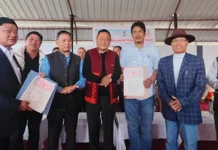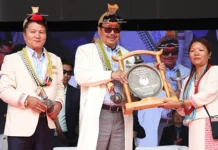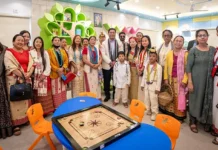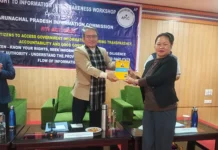[ Ranjit Sinha ]
The recently held three-day Arunachal Literature Festival – 2018 could well be termed the beginning of a new era of literary activities in the state in a bigger way, under the initiative of the Arunachal Pradesh government.
It is good to see that the state government has realized the importance of literature and literary activities, which had taken the shape of a silent revolution under the initiative of the Arunachal Pradesh Literary Society (APLS) and its president and noted author YD Thongchi more than a decade back.
With the presence of eminent authors from across the Northeast region and from New Delhi, including acclaimed writer and the BBC’s former New Delhi bureau chief Mark Tully, besides the presence of the author of the A Soldier’s General and former Arunachal Pradesh governor JJ Singh, the literary festival not doubt was eye-opener for the litterateurs and common people of the state.
Stirred by the wide range of topics that found place in the festival, the former governor dubbed it a landmark event, and expressed hope that such events would speed up the mission of spreading and enriching the literature and preserving the culture and tradition of the state.
Describing the tradition and culture of the people of the state as a unifying force in spreading love and promoting harmony, author Mark Tully expressed hope that henceforth Arunachal Pradesh would march forward as an important source of literature and culture in India.
Even though APLS president YD Thongchi rued the lethargy that submerged the literary world of the state after the end of NEFA era till 2000, from the panel discussion on the topic ‘Literature from the Northeast’, it was evident that Arunachal is not lagging behind in the field of literature. The festival showed the mainstream authors and scholars that Arunachal, which is devoid of a widely accepted common script, has not only produced three Sahitya Akademi awardees, but is also blessed with many talented and acclaimed litterateurs like Kaling Borang, Dr Jamuna Bini Tadar, Mohonto Panging, Yater Nyokir, Subi Taba, Ngurang Reena, Dr Joram Yalam Nabam, Dr Radhe Yampi, and many others.
The most important thing is that the festival succeeded in providing a platform to the writers of the northeastern region, and in enlightening the writers of the country about the status and richness of the literature of the region. Apart from this, it facilitated students and budding writers to interact with eminent writers of the country, which will go a long way in generating enthusiasm among the young writers of the state.
Having said all about the brighter side of the festival, I must say the festival failed to draw the number of people it had expected to. It also could not draw the desired level of media attention from across the country.
However, it would be unwise to draw a comparison between the literary sessions of the Asom Sahitya Sabha in our neighbouring state and the Arunachal Literature Festival – 2018, which was organized for the first time by the IPR department.
I wish, as was assured by IPR Minister Bamang Felix, that the festival would be turned into an annual event. I also hope that the organizer will fix a day especially for budding writers and artists from across the state during such festivals in the days to come, invite both the print and the electronic media from across the country, and, if possible, organise such literary festivals in open air (like the Festival of Arunachal) in order to generate interest among the common people in literature festivals and book reading.




